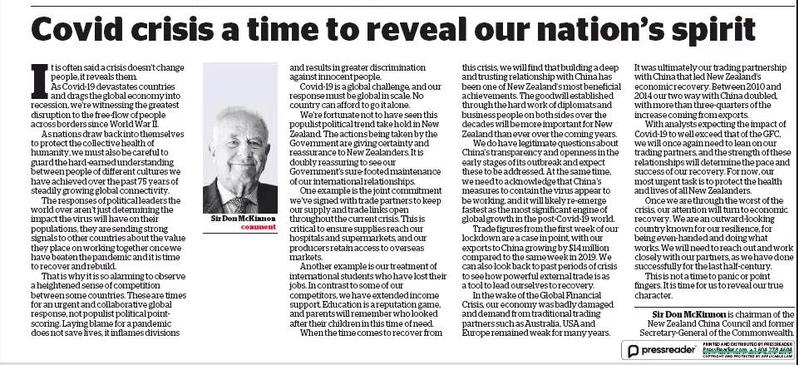作者:唐纳德·麦金农 发布时间:2020-04-29 来源:复旦发展研究院+收藏本文
导 读
新西兰-中国关系促进委员会主席唐纳德·麦金农爵士(Don McKinnon)4月22日在新西兰先驱报撰文呼吁,在危机时刻,新西兰应当彰显本国坚韧、公正、务实的民族精神,积极维系对外合作,珍惜新中两国美好友谊。全球各国也应携手共进,度过难关。危机是短暂的,全人类的合作发展却是长久的。沧海桑田,方显本色。复旦发展研究院将原文编译成中文,以飨读者。

有言道:危机不会改变人心,而会展现人心。
当前,COVID-19疫情给世界各国带来巨大损失,将全球经济拖入衰退泥潭,并且给跨国人员流动造成了自二战后最为严重的冲击。各国纷纷退守本土,以保障全人类的健康福祉。而与此同时,我们也必须时时警醒:在过去75年间,我们构筑全球连通,聚沙成塔,促成不同文化之间的相互理解。此番成就,来之不易,理应珍惜。
世界各国政要当下所作出的回应,不仅决定了疫情对其国民所产生的影响,也是向其他国家发出明确的信号,展现本国有关对外合作的价值理念,以及在战胜疫情之后将如何进行恢复和重建。
因而,在此时看到部分国家之间竞争激化,足以令人惊心。面对疫情,各国应当立即携手,共克时艰,而非煽动民粹主义,玩弄政治手腕。以疫情为罪名相互攻讦并不能拯救生命,只能加剧裂痕,恶化歧视现象,陷无辜民众于水火。COVID-19疫情是全球共同面临的挑战,所以我们必须采取全球规模的合作行动,予以应对。没有任何一个国家能够在此危机之中孤军作战、独木支撑。
值得庆幸的是,民粹主义政治倾向并未能够在新西兰大行其道。新西兰政府所采取的行动给人民带来了信心与安慰。而新西兰政府稳健的国际关系政策,更是令人倍感安心。
例如,新西兰政府已与多个贸易伙伴签订合作协议,确保在疫情期间保证新西兰方面的供应和贸易联系。这是一项关键举措,能够确保本土医院和超市得到供应,也为国内生产商维系了海外销售市场。再如,新西兰为失去工作机会的国际留学生提供了保障政策。新西兰采取了和部分竞争对手完全不同的做法,选择扩大收入补贴资助范围。教育行业以声誉为重,家长们会铭记,是谁曾在危急时刻照拂他们的子女。
待到进入疫情恢复期,我们将会意识到,与中国建立深度互信合作关系,是新西兰回报最高的有益举措。两国外交人员和商务人士经年累月、辛勤耕耘,筑就两国坚固友谊。在未来数年,这份友谊对于新西兰而言,将具有前所未有的重要意义。有关中国在疫情暴发早期的信息透明度和开放度问题,我们要以正当合理的方式提出疑问,期待获得解答。与此同时,我们也应当认识到,中国控制病毒传播的措施是有效的,且中国很有可能在疫情结束后以最快的速度恢复经济,成为世界经济增长的最强引擎。新西兰封城首周贸易数据就是例证:该周新西兰对中国出口贸易额比2019年同期增长1400万美元。
如果我们回顾过去的危机,也同样可以看到,对外贸易是引导我们走向恢复的重要工具。在全球金融危机的影响下,新西兰经济遭受重创,澳大利亚、美国和欧洲等传统贸易伙伴的需求量常年低迷。最终,是我们同中国的贸易合作关系帮助新西兰经济走向恢复。2010至2014年,我们与中国的双向贸易量翻倍,其中四分之三的增长来自于出口贸易。
有分析认为,COVID-19带来的影响将远远超过全球金融危机。我们将有必要再次倚靠贸易伙伴、倚靠对外关系,才能平稳地、顺利地度过恢复期。
眼下,我们最紧急的任务,就是捍卫新西兰人民的健康与生命。一旦度过疫情最严峻的阶段,我们的重心就要转向经济恢复。我们是一个对外开放的国家,以坚韧不拔、不偏不倚、敦本务实闻名。我们应当积极对外交流,与贸易伙伴紧密合作,正如我们在过去半个世纪以来所做到的那样。
危机时刻,不该惊慌失措、指手画脚。
危机时刻,方应彰显我们的真正本色。

Covid crisis a timetoreveal our nation's spirit
April 22, 2020
It is often said a crisis doesn’t change people, it reveals them.
As COVID-19 devastates countries and drags the global economy into recession, we’re witnessing the greatest disruption to the free flow of people across national borders since World War Two. As nations draw back into themselves to protect the collective health of humanity, we must also be careful to guard the hard-earned understanding between people of different cultures we have achieved over the past 75 years of steadily growing global connectivity.
The responses of political leaders the world over aren’t just determining the impact the virus will have on their populations, they are sending strong signals to other countries about the value they place on working together once we have beaten the pandemic and it is time to recover and rebuild.
That is why it is so alarming to observe a heightened sense of competition between some countries. These are times for an urgent and collaborative global response, not populist political point-scoring. Laying blame for a pandemic does not save lives, it inflames divisions and results in greater discrimination against innocent people. COVID-19 is a global challenge, and our response must be global in scale. No country can afford to go it alone.
We’re fortunate not to have seen this populist political trend take hold in New Zealand. The actions being taken by the government are giving certainty and reassurance to New Zealanders. It is doubly reassuring to see our government’s sure-footed maintenance of our international relationships.
One example is the joint commitment we’ve signed with trade partners to keep our supply and trade links open throughout the current crisis. This is critical to ensure supplies reach our hospitals and supermarkets, and our producers retain access to overseas markets. Another example is our treatment of international students who have lost their jobs. In contrast to some of our competitors, we have extended income support. Education is a reputation game, and parents will remember who looked after their children in this time of need.
When the time comes to recover from this crisis, we will find that building a deep and trusting relationship with China has been one of New Zealand’s most beneficial achievements. The goodwill established through the hard work of diplomats and business people on both sides over the decades will be more important for New Zealand than ever over the coming years. We do have legitimate questions about China’s transparency and openness in the early stages of its outbreak and expect these to be addressed. At the same time, we need to acknowledge that China’s measures to contain the virus appear to be working, and that China will likely re-emerge fastest as the most significant engine of global growth in the post-COVID-19 world. Trade figures from the first week of our lockdown are a case in point, with our exports to China growing by $14 million compared to the same week in 2019.
We can also look back to past periods of crisis to see just how powerful external trade is as a tool to lead ourselves to recovery. In the wake of the Global Financial Crisis, our economy was badly damaged and demand from traditional trading partners like Australia, USA and Europe remained weak for many years. It was ultimately our trading partnership with China that led New Zealand’s economic recovery. Between 2010 and 2014 our two way with China doubled, with more than three-quarters of the increase coming from exports.
With analysts expecting the impact of COVID-19 to well exceed that of the GFC, we will once again need to lean on our trading partners, and the strength of these relationships will determine the pace and success of our recovery.
For now, our most urgent task is to protect the health and lives of all New Zealanders. Once we are through the worst of the crisis, our attention will turn to economic recovery. We are an outward-looking country known for our resilience, for being even-handed and doing what works. We will need to reach out and work closely with our partners, as we have done successfully for the last half-century.
This is not a time to panic or point fingers. It is time for us to reveal our true character.
Sir Don McKinnon is Chairman of the New Zealand China Council and former Secretary-General of the Commonwealth.
*This article was published in the New Zealand Herald on 22 April 2020.
文章编译 | 复旦发展研究院 焦露曦